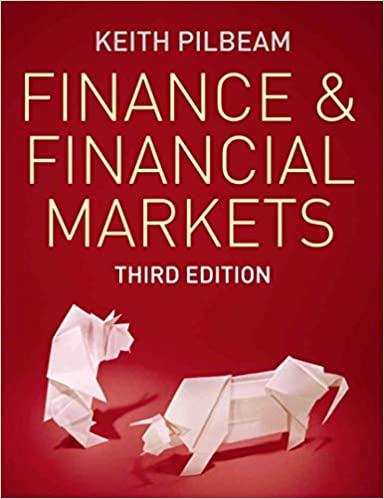Question
This question has multiple parts. Thank you for your help! Clifford Clark is a recent retiree who is interested in investing some of his savings
This question has multiple parts. Thank you for your help!
Clifford Clark is a recent retiree who is interested in investing some of his savings in corporate bonds. His financial planner has suggested the following bonds:
Bond A has an 11% annual coupon, matures in 12 years, and has a $1,000 face value.
Bond B has a 9% annual coupon, matures in 12 years, and has a $1,000 face value.
Bond C has a 7% annual coupon, matures in 12 years, and has a $1,000 face value.
Each bond has a yield to maturity of 9%.
Calculate the price of each of the three bonds. Round your answers to the nearest cent.
Price (Bond A): $___
Price (Bond B): $___
Price (Bond C): $___
Calculate the current yield for each of the three bonds. (Hint: The expected current yield is calculated as the annual interest divided by the price of the bond.) Round your answers to two decimal places.
Current yield (Bond A): ____ %
Current yield (Bond B): ______ %
Current yield (Bond C): ___ %
If the yield to maturity for each bond remains at 9%, what will be the price of each bond 1 year from now? Round your answers to the nearest cent.
Price (Bond A): $ _____
Price (Bond B): $ ____
Price (Bond C): $ _____
What is the expected capital gains yield for each bond? What is the expected total return for each bond? Round your answers to two decimal places.
| Bond A | Bond B | Bond C | |
| Expected capital gains yield | |||
| Expected total return |
Mr. Clark is considering another bond, Bond D. It has a 7% semiannual coupon and a $1,000 face value (i.e., it pays a $35 coupon every 6 months). Bond D is scheduled to mature in 8 years and has a price of $1,140. It is also callable in 6 years at a call price of $1,080.
What is the bond's nominal yield to maturity? Round your answer to two decimal places.
_____ %
What is the bond's nominal yield to call? Round your answer to two decimal places.
_____ %
Calculate the price of each bond (A, B, and C) at the end of each year until maturity, assuming interest rates remain constant. Round your answers to the nearest cent.
| Years Remaining | ||||
| Until Maturity | Bond A | Bond B | Bond C | |
| 12 | ||||
| 11 | ||||
| 10 | ||||
| 9 | ||||
| 8 | ||||
| 7 | ||||
| 6 | ||||
| 5 | ||||
| 4 | ||||
| 3 | ||||
| 2 | ||||
| 1 | ||||
| 0 | ||||
Step by Step Solution
There are 3 Steps involved in it
Step: 1

Get Instant Access to Expert-Tailored Solutions
See step-by-step solutions with expert insights and AI powered tools for academic success
Step: 2

Step: 3

Ace Your Homework with AI
Get the answers you need in no time with our AI-driven, step-by-step assistance
Get Started


